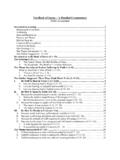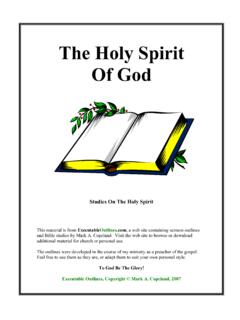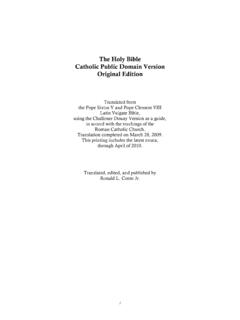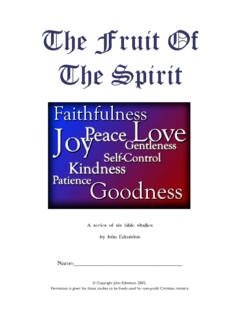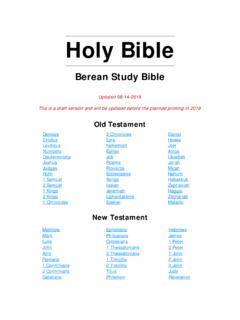Transcription of Romans Chapter 8 - Basic Training Bible Ministries
1 1 Romans Chapter 8 The Work of God for Sanctification Introduction: I. Context A. The Book of Romans : 1. Book Theme: Rom. 1:16 17, the power of God to save .. the just shall live by faith. A corollary theme is obedience to the faith, 1:5 and 16:26 (bookends). The word obey, obedience (hupakoe/hupakouo) occurs 11 times. 2. Book Outline: a systematic and doctrinal development of the theme. Prologue: 1:1 17, the Gospel message and ministry, theme of book. a. Chapter 1:18 Chapter3:20: condemnation: the need for God s saving power and obedient faith. b. Chapter 4 5: justification: the provision of saving power to all who believe. c. Chapter 6 8: sanctification: the continuing power of God to save in time. Here Paul develops the from faith [justification] to faith [sanctification].
2 D. Chapter 9 11: dispensation: God s power/faithfulness demonstrated by Israel. A very crucial point made where there is no faith, God will not save! e. Chapter 12 15:13: transformation: the outworking of sanctification in life. f. Chapter 15:13 16: conclusion: final instructions, greetings, and benediction. B. In the Immediate Context, Chapter 6 8. 1. Chapter 6: Two questions posed and answered regarding sanctification. a. The first (v. 1) based on potential misapplication of 5:20. b. The second (v. 15) based on potential misapplication of 6:14. 2. Chapter 7: The relation ship of Moses Law to sin (vv. 1 12) and the believer (vv. 13 25). The main thrust is that the Law cannot produce sanctification for us. 3. Chapter 8: Reaches back to 5:1 2 ( we have peace, this grace in which we stand ), vv.
3 16 17 ( reign .. through the One, Jesus Christ. ) to summarize Chapter 6 7, and specifically to answer the cry of Paul and his conclusion in 7:24 25. II. The Flow of the Argument, Chapter 8. A. Because of the finished work of Christ, the believer is free from all condemnation (vv. 1 11). B. By means of the continuing work of the spirit , the believer is free from the dominion of sin (vv. 12 27). C. On the basis of God s sovereign and eternal plan, the believer is free as a result of the defeat of sin ( 39). Note: The words free, (v. 2) delivered, liberty (v. 21) all come from eleutheroo, meaning liberation, one of Paul s favorite words for the effects of justification (cf. :1, 13). This word occurs in 6:18, 20, 22, and in 7:3, and is now fully developed in Romans 8. Note that in the three usages in this Chapter , the first (8:1) refers to the work of Christ, the second (8:21) to 2 the final work of the Father, and the third (8:21) refers to the present work of the spirit in sanctification.
4 Final Note: It is of value to consider that only one imperative occurs in this Chapter aimed at what we should do, and that relates to the duty of prayer (8:26). Here the word ought is dei, a verb of necessity. In the imperative, it implies that which we must do (pray), and follows logically the word debtors (opheilo, v. 12) as the primary means toward an end, , not .. to live according to the flesh. This is true because the command section for the out-working of sanctification is Chapters 12 13. Chapters 6 8 speak primarily of God s work for us. Chapter 8 Outline: I. No Condemnation of Sin (vv .1 11) by the finished work of Jesus Christ for us. II. No Dominion by Sin (vv. 12 27) due to the present work of the spirit in us. III. No Defeat from Sin (vv. 28 39) because of the Father s sovereign/eternal plan.
5 I. No Condemnation of Sin in Christ Jesus, vv. 1 11. [Review 7:24 25: deliver is rhuomai (in future, middle voice, indicative). It was used of a soldier who ran to the aid of his comrade to deliver him from the enemy. The effect of Christ coming to our aid in sanctification is the freedom we find in the eighth Chapter .] A. Because of our standing in Him, v. 1. 1. No condemnation means NONE! No charges can be brought against us (v. 33). The now refers to our justified state (cf. 5:1 2). 2. Those .. in Christ Jesus. This Chapter begins (v. 1) and ends (v. 39) with our position. We cannot begin to change our STATE until we are grounded, by faith, in our STANDING! Remember, the Christian life is from faith [justified] to faith [sanctified], and the just [justified by faith] shall live by faith, (Rom.)
6 1:17). 3. Who walk not .. This is omitted in the earliest manuscripts, included by Textual Reasoning (TR) and Majority texts. If included is epexegetical, as the parenthetical of Eph. 2:5 by grace you are saved. It cannot be divorced from its practical sense in v. 4. B. Because of the Law of the spirit of Life, v. 2 7. 1. The law of .. life in Christ refers to regeneration, both as an accomplished fact, and as an ongoing power (law) of renewal. See Rom. 6:4 and Rom. 7:6, newness is kainotes (dative of advantage), meaning recent, new, strange. Newness of life comes from the renewing power of the indwelling spirit . Newness of life (sanctification) follows new life (regeneration). 2. Made me free eleutheroo (aorist, indicative) a finished, once for all work of liberation, law of sin and death.
7 This must be distinguished from law of sin in my members ( , indwelling sin, Rom. 7:23), for it speaks of the universal law that sin brings death (5:12, 8:13a). The point is that we are no longer subject to sin s condemnation. 3. Sin judged in totality. For what the law could not do .. God did. The law here is Moses Law, which could pronounce judgment, but could not execute it. The law could neither ultimately judge sin, nor liberate from its power. God did this by executing His Son in our place, and giving us His righteousness and the indwelling spirit . 3 4. Righteousness imparted completely.. [so] that [purpose] righteous requirement of the law. What is the dikaioma? a. That all sin and sins must be judged with death. b. That the law must be fulfilled in righteous obedience in every detail.
8 C. Jesus accomplished the second (b.) by His life (Mat. 5:17) and the first (a.) by His death on our behalf. d. Expiation of sin, justification, and imputation of His righteousness makes it real. e. Might be fulfilled [result] in us, pleroo (aorist, passive, subjective). f. The future potential of sanctification produced in us by the Holy spirit . True spirituality is the life of Christ (Mat. 5:17) lived out in us by His spirit . g. We do not do it, we allow it to be done! (Cf. let Col. 3:15 16.) h. It is the submission of present yourselves in 6:13; 12:1. i. Walk not .. but according to the spirit , strong contrast (alla) with kata, according to the standard of the spirit , , the very life of Jesus Christ. C. The Practical Implications, 7 1. Those who live eimi (present, active, participle), literally being in accordance with.
9 2. Set their minds phroneo (present, active, indicative), to think on, dwell on habitually. Note: Paul is now explaining a somewhat enigmatic statement ending Rom. 7:25. Only the resolute setting of the mind on spiritual truth, to the exclusion of the things of the flesh, can result in the Holy spirit having freedom to work in us. 3. Spiritually minded .. life and peace. We cannot produce obedience, leading to abundant life and peace. Only by renewing the mind can we be sanctified, or conformed (8:29) or transformed (12:2) into the image of Jesus Christ. 4. The carnal mind, the mind set on the thoughts, motives, intents, and desires, of the flesh is at war against God, even in the life of the carnal believer. It leads to rebellion and hostility, and ultimately destruction. No one fights God and wins!
10 On this mindset and its effects see Mat. 16:16-23, where Peter goes from the spiritual to the fleshly mindset in a few moments. D. Because of the Divine Indwelling, vv. 8 11. Verses 8 9, our new sphere of life. [Note the shift here from according to to in. Whereas 7 explain what it means to walk according to the spirit , Paul now returns to our positional standing in Christ. We are said to be in the spirit (our sphere of life, cf. Gal. 5:25). This is true because being in Christ we have the spirit dwelling in us. The idea of a coming of the spirit after justification is declared in v. 9 to be impossible.] 1. Three great points (take note of if indeed .. if .. if, in 11). a. The unbeliever ( those in the flesh, cf. Tit. 3:3) cannot satisfy the righteous requirement of the law and so please God regarding justification or sanctification.

